Public service reform bodies’ suggestion to be reviewed
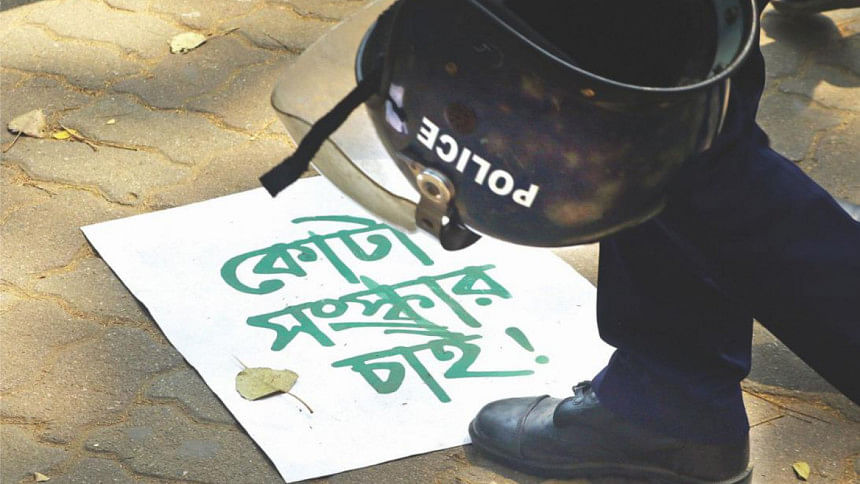
The recommendations made by several public service reform committees and Public Service Commission since the introduction of quota system in civil service in 1972 would be reviewed to decide on either reformation or cancellation of the system.
Cabinet Secretary M Shafiul Alam said this after the seven-member committee formed “to review or reform or cancel” the quota system for the civil service today held its first meeting.
The committee will come up with an outcome on the format of the quota system within the designated time frame, said Cabinet Secretary M Shafiul Alam who is leading the committee.
The committee conducted the meeting at the Cabinet Division of the Secretariat in Dhaka from 11:30am to 12:30am, reports our senior staff correspondent.
The government formed the committee on July 2 asking it to submit a report within 15 workings days amid protests by students and jobseekers demanding reformation of the quota system, and after some of them were attacked allegedly by Bangladesh Chhatra League activists.
Other members of the committee are secretaries of public administration ministry, finance ministry, Liberation War affairs ministry, law ministry (legislative division), Public Service Commission, along with acting secretary to the Prime Minister's Office.
The call for reforming the quota system for government jobs was voiced just a year after it was introduced in 1972 and since then, several public service reform committees and the Public Service Commission itself, the body that oversees government recruitment, have objected to the policy.
However, documents show subsequent governments paid no heed to the suggestions for making room for more efficient people in bureaucracy by reforming the quota structure, leading to today's anger among the youths in the midst of a slowing job market.
All these recommendations had strong arguments evidenced by statistics that while some positive discrimination is required for the disadvantaged groups, other provisions simply discourage meritocracy.
In 1972, two high-powered reform bodies were assigned to make suggestions for the civil bureaucracy. It recommended next year several measures for selection process based on merit and long-term career planning.
In 1976, the Pay and Service Commission was formed and that also recommended merit-based recruitment. Meanwhile, the government increased merit quota to 40 percent from 20 percent and district quota was halved to 20 percent.
Talking to this newspaper recently, former caretaker govt adviser Akbar Ali Khan said that in 1977, almost all members of the then Pay and Service Commission expressed their opposition to enforcing any type of quota for recruiting government officers.
From 1982 to 1984, two major reform bodies were appointed -- one a martial law committee and the other a civilian one.
Later in 1985, during the martial law rule of HM Ershad, the quota for the war-affected women was discontinued as no job seekers were found and this quota was given for women candidates as a major step to promote women empowerment. Ershad, for the first time, also introduced a 5 percent quota for the ethnic minorities.
In December 1996, after the Awami League government came to power, the Public Administration Reform Commission was set up as the first major attempt to modernise the bureaucracy.
The commission observed that the quota system on the face of it is unconstitutional and proposed a constitutionally supportive recruitment policy is followed.
The commission had recommended an increase in the merit quota to 55 percent from 45 percent.
The quota for freedom fighters was a problem area from the beginning because the required number of candidates was not found as an analysis of this category from 1982 to 1990 shows.
In 1982, seven percent of the quota was fulfilled against 30 percent allocation. This dipped continuously except in 1984 and in 1990 only one percent was fulfilled.
The posts against the unfulfilled quota remain vacant and the commission fulfils the empty posts with candidates from the next examination. In the context of such unfulfilled posts, the PSC recommended an increase in merit and women quotas.
“This request continued since 1987, but for ten years the government remains silent on the issue,” AMM Shawkat Ali, a former bureaucrat and adviser to a caretaker government, wrote in his book “Bangladesh Civil Service: a political-administrative perspective”.
“During this period of ten years, committees constituted by the government and other studies sponsored by the government also recommended reduction of quota for freedom fighters.”
However, instead of reforming this quota, the government in 1997 extended the freedom fighters' quota to include their descendants, making things even more complicated.
Another big drawback of the current quota system is that it leads to misuse of the system, defeating the purpose of helping those from backward communities.
Experts say those who already enjoyed quota privileges should not be eligible for that again. Their descendants also should not have it either, because a person who benefitted from this system should already have established his or her family and children.
Earlier in February, students of different public universities and jobseekers, under the banner of "Bangladesh Sadharan Chhatra Adhikar Sangrakkhan Parishad", started a movement demanding reforms in the quota.
Amid countrywide agitation, Prime Minister Sheikh Hasina, on April 11, announced the abolition all types of quotas in public jobs.
But as no gazette notification was issued in this regard, the protesters began boycotting classes and examinations in all universities and colleges on May 14 for an indefinite period.
At present, 56 percent of government jobs are reserved for candidates under various quotas. Of the 56 percent, 30 percent are kept for freedom fighters' children and grandchildren, 10 percent for women, 10 percent for people of underdeveloped districts, five percent for members of indigenous communities and one percent for the physically challenged.

 For all latest news, follow The Daily Star's Google News channel.
For all latest news, follow The Daily Star's Google News channel. 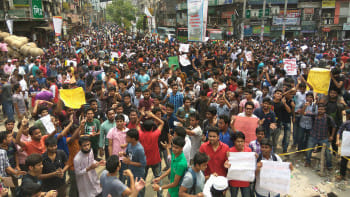


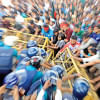
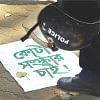

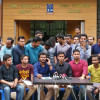



Comments